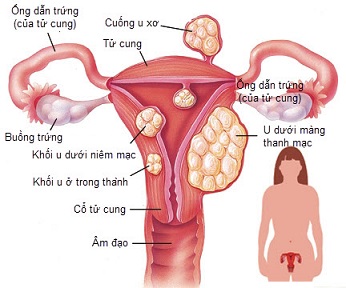 Metrorrhagia, menstrual cramps, disorders of micturition, dyspareunia, etc. are some expressions of uterine fibroids – a benign tumor. However, if not treated in time, it will result in many regrettable consequences such as fetal compression leading to miscarriage, premature delivery or distortion of the uterine cavity, hindering the impregnation that increases risks of infertility.
Metrorrhagia, menstrual cramps, disorders of micturition, dyspareunia, etc. are some expressions of uterine fibroids – a benign tumor. However, if not treated in time, it will result in many regrettable consequences such as fetal compression leading to miscarriage, premature delivery or distortion of the uterine cavity, hindering the impregnation that increases risks of infertility.
Benign tumor but “not benign” complications
Mrs. L.T.N, 46 years old (Hoc Mon District, Ho Chi Minh City) recalled and shared: “In 2005, after 3 miscarriages, I went to take an examination at Tu Du hospital and found that I had a 30 mm uterine fibroid. Doctors told me to keep track of it and assigned an operation, but it would affect my reproductive capacity, so they advised me to “live with” that benign tumor. It would be okay for me to give birth if I was pregnant, and if not I could decide to have an operation. After hearing what my doctors told me, I felt very sad and depressed”.
Mrs. T.Q.C (Ho Chi Minh City) had a stillbirth after 4 weeks of pregnancy. When going to have an examination, she knew that the cause of her stillbirth was due to a tumor in her womb compressing the fetus. She decided to have an operation to remove the tumor. But when conducting the operation, doctors detected the tumor was in a complex position that could not be removed immediately, so only one thirds of the tumor was removed. She was injected with Zoladex for 4 consecutive months with each injection per month. At that time, she was in very bad mood and pessimistic about her health condition.
Having the same situation as Mrs. L.T.N. and Mrs. T.Q.C., many other female patients of reproductive age suffering from uterine fibroids are worried that it will affect their maternity. Especially it would be very sad for those who discovered their tumor late which would lead to larger tumor size causing compression to surrounding organs and being appointed to take an ablation surgery or resection of the uterus.
So, what are uterine fibroids? How do they affect woman’s reproductive health?
Uterine fibroids are tumors made of uterine muscle cells that grow within the wall of the uterus. Although fibroids are called “tumors” but most are benign (only 0.1% is cancerous). Fibroids may grow as a single tumor or in clusters (multiple fibroid tumors), vary in size from some millimeters (only detectable by ultrasound) but may also grow bigger near the sternum and occupy the whole abdomen. This is the most common tumor in women of reproductive age. The cause of uterine fibroids is not known. Many women do not have any symptoms. However, when uterine fibroids grow bigger gradually, they can cause compression to the bladder, urinary tract, and urination disorders. Or depending on the location of the tumors, they can cause pain, dysmenorrhea, menorrhagia and polymenorrhea
During pregnancy, women with uterine fibroids may have premature birth, easy abnormalities of presentation, placenta sticking in abnormal position (placenta previa, placenta percreta). Uterine fibroids also cause prolonged labour. Large tumors in “serious” positions may even make the woman unable to give birth, take an operation instead and have higher risk of metrorrhagia.
placenta sticking in abnormal position (placenta previa, placenta percreta). Uterine fibroids also cause prolonged labour. Large tumors in “serious” positions may even make the woman unable to give birth, take an operation instead and have higher risk of metrorrhagia.
If the tumors are more than 5 cm in size requiring ablation surgery (still preserving the uterus), patients may still be pregnant but have to wait at least three years. When pregnant, patients should be closely monitored because of the risk of uterine rupture causing death to mother and the fetus.
Moreover, uterine fibroids can cause infertility by altering the endometrium, unconducive to the nesting of eggs during fertilization. They can also compress and fold the fallopian tube or clog the cervical os. For those who are already pregnant, uterine fibroids can cause recurrent miscarriages because the endometrium does not develop fully and the ovary is compressed that makes it unable to grow bigger.
Surgical or medical treatment?
Currently two treatment methods of uterine fibroids are surgery and medical treatment (using medicines). The choice of method depends on tumor size, age and needs of giving birth of the woman.
Surgery is an inevitable method when the tumor has been too big. Resection of tumor is usually for patients with hypermenorrhea or heavy menorrhagia who are nearly or already in menopause age and have no needs to give birth. If still young, patients can use ablation surgery method as mentioned above. However, not every tumor can use this method, especially for the tumors in dangerous positions and because recurrence rate is so high after ablation surgery.
The second method is medical treatment. Previously, doctors often use new medicines synthesized from chemical active substances which help reduce pain and tumor size, easy for ablation. However, these medicines make patients have symptoms similar to those of menopause such as hot flashes, depression, sleeping difficulties, arthraegia, decreased sexual ability, etc.
In order to avoid undesirable symptoms of chemically synthetic products, scientists have currently embarked on research of biologically active substances present in herbal plants. One of the successful research projects in Vietnam’s medicine is Crila® capsule which is formulated from Crinum latifolium L. This is the first Vietnamese herbal medicine for specific treatment of uterine fibroids. This product has been accepted for national circulation by Vietnam Drug Administration – the Ministry of Health and included in the list of national medicinal products by the Ministry of Health.
Vietnamese medicines with unexpected treatment efficacy
Crila® capsule is the result of 15 years of comprehensive research on botany, cultivation, care and harvest under GAP-WHO guidelines; study of specific genetic characteristics of Crinum latifolium L. based on genetic research (DNA); study of chemical composition and biological effects; study of extraction and formulation; study of pharmacological toxicity; and clinical studies, etc. by Doctor-Pharmacist Nguyen Thi Ngoc Tram and her colleagues.
For being recognized as medicines, Crila® has been conducted with clinical trials under regulation 371 of the Ministry of Health through 3 stages at three hospitals: HCMC Hospital of Traditional Medicine, National Hospital of Obstetrics and Gynecology and Tu Du Hospital. The clinical results showed that treatment efficacy of Crila® on uterine fibroids is 79.5% and demonstrated that Crila® is highly safe for patients, without side effects, not affecting functions of liver, kidney and other organs of the body.
The case of Mrs. L.T.N. is a testament to the quality and treatment efficacy of Crila® compared to imported expensive medicinal products. After 2 months of using Crila®, Mrs. L.T.N. went for an ultrasound which showed that her tumor was shrunk completely, only horn scales left, then she got pregnant and gave birth to a lovely baby girl – her happiness after three miscarriages. She named her daughter Ngoc Tram to show deep gratitude to the woman who has dedicated her whole life to produce medicines bringing joy of motherhood to her. Sharing the joy of not suffering pain from surgery is the case of Mrs. C.T.L. (from Da Nang City) whose tumor is 73x49x51 mm in size and indicated for surgery by her doctors. She knew about Crila® by chance. After 9 weeks of taking Crila®, she went for an examination again which showed that her tumor size reduced to 28x34 mm that made her very happy and surprised.
Not stopping at local patients, Ms. Sue McKinney who is director of Crila Health company – an exclusive distribution partner in America shared that after 2 years of its presentation in the U.S. market, Crila® has had a strong foothold in the heart of consumers. She said that Dr. Michael Scott – a famous obstetrician in Atlanta, U.S.A. – after having come to Vietnam to meet Dr. Tram and learn about the effects of Crila® capsule, suddenly exclaimed: “Crila® is another way of treatment that doctors can prescribe for patients without causing negative side effects which are often seen in many expensive pharmaceuticals”.
With concerns to create medicines from Vietnamese herbs with high efficacy and reasonable price for patients, Doctor-Pharmacist Nguyen Thi Ngoc Tram has studied hard and given birth to Crila® capsule. This is the only capsule in Vietnam recognized as medicines for treatment of uterine fibroids by the Ministry of Health, formulated from bioactive substances of Crinum latifolium L. var. crilae Tram & Khanh, var. n – a novel variety of Crinum latifolium L. Crila® is also voted and nominated as national medicinal product by the Ministry of Health, and invested in research and development to serve local patients’ health and export. This is not only the joy of Doctor – Pharmacist Nguyen Thi Ngoc Tram when her medicinal product is increasingly trusted by more and more patients but also the pride of Thien Duoc company who has manufactured and brought consumers Vietnamese herbal medicines with high quality and efficacy.
